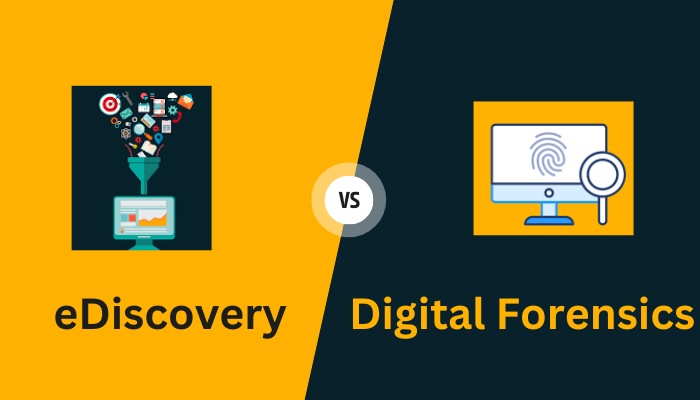Technology | 3 Minutes Reading
eDiscovery vs Digital Forensics – A Detailed Comparison

This technical guide explains eDiscovery vs digital forensics. Stay tuned till the end to find a complete analysis and the difference between eDiscovery and digital forensics.
A Brief Introduction to eDiscovery and Digital Forensics
- eDiscovery: It is short for electronic discovery. It is a process to identify, collect, and produce electronically stored information (ESI). This information is used for legal purposes including litigation, investigation, and compliance.
- Digital Forensics: It is a systematic process used for analyzing ESI, electronic devices, and digital evidence to carve out hidden information related to cyber fraud. Compared to eDiscovery, it is a broader field including different types of investigations.
eDiscovery vs Digital Forensics – What are the Scopes & Objectives?
Let’s first cover the objectives and then move on to the scope.
The prime objectives of eDiscovery are:
- To locate and retrieve relevant documents and data.
- To ensure compliance with legal regulations and discovery requests.
- To facilitate review and analysis of electronic information.
Now, let’s have a look at the main objectives of digital forensics.
- To investigate cybercrimes, security incidents, and illegal activities.
- To gather and preserve digital evidence for solving cases (both criminal and civil cases)
- To find the root cause of a security incident and mitigate future risks.
Next, let’s discuss the scope of application for both. eDiscovery is primarily used in legal proceedings, lawsuits, and compliance investigations. In other words, eDiscovery comes into the picture while solving civil cases.
On the other hand, digital forensics is applied to criminal investigations, cybersecurity incidents, and internal corporate investigations. The professionals mainly focus on analyzing electronic devices, networks, and storage media.
Difference Between eDiscovery and Digital Forensics in Terms of Process
The process of both eDiscovery and digital forensics may seem similar but they are not.
1. eDiscovery Process
Step 1. Identifying and preserving relevant ESI.
Step 2. Collecting and processing electronic data.
Step 3. Reviewing and analyzing documents for legal relevance.
Step 4. Producing discovered information for legal proceedings.
2. Digital Forensics Process
Step 1. Acquiring and preserving digital evidence.
Step 2. Analyzing digital artifacts in a forensically sound manner.
Step 3. Reconstructing relevant events and timelines to back the case.
Step 4. Documenting and reporting the findings.
eDiscovery vs Digital Forensics – Comparison In Terms of Skill Set and Expertise
To perform eDiscovery, one must have legal knowledge and an understanding of litigation processes. Along with that one should be proficient in eDiscovery software and document review techniques. This includes knowing document management systems, data processing & reviewing platforms, text analytics & search algorithms, etc. Otherwise, there are chances of information gaps during an investigation.
In the case of digital forensics, one should have expertise in cybersecurity and related concepts. Also, one must have technical skills such as a deep understanding of digital systems and data structures. Knowing criminal and investigation processes would be an added benefit.
Along with having theoretical knowledge practical knowledge is also important. One must know how to use forensic tools for disk imaging, network analysis, mobile device forensics, email header analysis, etc.
Note: One such forensic tool is MailXaminer. It specializes in performing email forensic investigation. The tool made its presence among law enforcement agencies and is used worldwide. If you’re a forensic professional and dealing with email for carving out relevant evidence then this is the tool you need. Try it now!
Conclusion
In the fields of law, investigations, and cybersecurity, eDiscovery and digital forensics have different uses even though they both deal with electronic information. Hence, this article considered all the possible aspects and gave a clear comparison or difference between eDiscovery and digital forensics.


